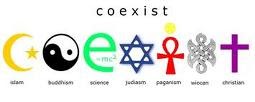The Beginning of Freedom of or from Religion
The Age of Enlightenment of the 18th century was a time of independent thinking leading to new ideas on freedom, religion and social structure. It was a time when science began to propose alternative explanations to occurrences and events that were traditionally and unconditionally accepted to be the design of God. Questioning of customary beliefs and critical thinking were introduced as men began to explore scientific reasoning and skepticism.
 |
| Parisian salon |
Today we can still see many benefits from the Age of Enlightenment. The Enlightenment’s ideals helped construct the foundation of American democracy as we know it today. Women began mingling with educated men in the intellectual settings of Parisian salons, where we start to get our first glimpse of society’s acceptance of women’s intelligence and a small acknowledgment that women may have worthwhile contributions. The Industrial Revolution brought better technology and improved methods in the farming and manufacturing fields that encouraged the creation of the economic system. Although all these contributions have a significant impact on our lives today, the introduction of independence from religion is one that is very important to me.
 |
| Spanish Inquisition |
Prior to the Age of Enlightenment, questioning of religious beliefs and organizations would not be tolerated. Any person who did was labeled a heretic and would face severe consequences by the church. Inquisitions were carried out, people were tortured to elicit confessions and admissions, and the punishment of death was dispensed to anyone found guilty. People feared an unmerciful God and the hands of a brutal church. All this was carried out because the church needed to maintain power and control.
During the Age of Enlightenment, as the idea of reasoning was gaining popularity, intellectuals began questioning the authority of the church and the concept of God and religion. Attitudes were shifting towards discovering natural laws in society. Discussions often lead to the conclusion that God either did not exist, or was not as influential in day to day life as previously believed. This new line of thinking about God and religion was embraced and continued to develop through-out time.
Fortunately for me this new way of thinking is partnered with America
So for me, I choose to be Agnostic. Agnosticism is the belief that the existence of god or other religious deity is unknown, or unproven. (This should not be confused with Atheism, which is the disbelief in any and all gods or religious deities.) Agnosticism is a personal belief that I have chosen for myself because I find that I am naturally skeptical. The absence of proof to the contrary doesn’t automatically convince me of something’s existence. Being agnostic allows me to be open to the possibilities of all religions, to question weather God exists or not, and to also be open to scientific explanations.
The freedom to choose is not a freedom afforded to all people in today’s world. Many countries still have strong attitudes towards religion and those who oppose or question the current belief system are persecuted. Luckily I live in a country that gives me the freedom to choose what I want. And although true and total freedom of and from religion was not accomplished during the Age of Enlightenment, it was the first steps that brought us to where we are today.

No comments:
Post a Comment